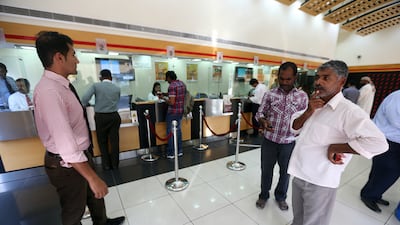A rally in the US dollar in the past several weeks has increased the value of the remittances that Asian blue-collar workers in the UAE send home to their parents, spouses and children.
The resurgence of the dollar has been especially welcomed, as it coincides with the major religious festivals of Eid for Muslims and Diwali for Hindus. Many exchange houses in the UAE are excited about the extra business this may bring them. The exchange house Xpress Money said that it expected a rise of up to 20 per cent in remittances from the UAE until Christmas.
"Customers, particularly South Asians, tend to remit higher amounts of money to their families back home during the festive season," said Sudhesh Giriyan, the vice president and business head at Xpress Money.
"This year we expect the increase to be in the range of 18 per cent to 20 per cent to major receive markets, where festivals are celebrated with enthusiasm."
But because many labourers in the UAE earn small salaries, it doesn't necessarily mean that they will send more money on an individual basis this year. That is because at the same time the cost of living in the country has become more expensive. And in some countries such as Egypt, where many products rely on an imported component, it may not have a massive beneficial effect on those who receive the funds because they will end up paying more for goods when the dollar strengthens against their currencies. Still, as the UAE population grows, exchange houses will certainly benefit from churning greater amounts of cash.
The dollar's surge has been propelled by signs that the world's largest economy is on its way to making a full recovery from the financial crash of 2008.
The Bloomberg Dollar Spot Index has been on a roll for seven weeks, the longest rally in four years, amid increasing signs that the US Federal Reserve may start raising interest rates for the first time since 2006 as the unemployment rate drops and GDP rises. The UAE dirham is pegged to the US currency at about Dh3.67 per dollar.
This has meant that workers exchanging dirhams for currencies such as the Indian rupee, the Indonesian rupiah and the Philippine peso have been getting more bang for their dirham in recent weeks. The dirham has gained 3.5 per cent against the rupiah, 3 per cent against the peso and 2 per cent against the rupee in the past four weeks. Remitters to Europe are also happy, as the euro has slid by 7.9 per cent in the past three months.
"I can really feel the difference," said Suresh Ravi, a 40 year old engineer in Abu Dhabi who sends Dh6,000 to his wife and two daughters in Kerala on a monthly basis.
Rommel, an Abu Dhabi-based Filipino who asked only to be identified by his first name, said he also sends money back every month to Manila and that when he last transferred money last week, it was about 12.6 pesos to the dirham – the best rate he has seen since the beginning of the year. Still, he does not feel motivated to send more as the cost of rent and other essential expenses increase in Abu Dhabi rise.
"The prices have been getting better because the rupee is weakening," said Saeed Jamali, an Indian electrician who was sending Dh1,200 to Bangalore at an exchange house in Abu Dhabi Mall. "But I'm not expecting to send an extra amount ahead of Diwali because my salary isn't so big, so I'd send just an extra Dh100 or Dh200. It's good though that my family will be getting a little more this month because of the favourable exchange rate."
mkassem@thenational.ae
halsayegh@thenational.ae
Follow The National's Business section on Twitter

US dollar’s rise is good for workers and great for exchange houses
Strong US dollar brings extra joy to the Asian families of labourers in the UAE sending money back home during festive season.
Most popular today
